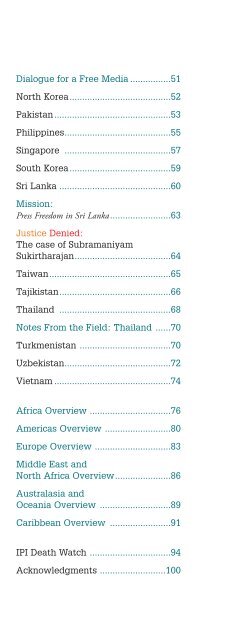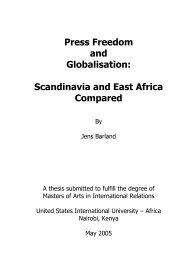FOcus On - International Press Institute
FOcus On - International Press Institute
FOcus On - International Press Institute
You also want an ePaper? Increase the reach of your titles
YUMPU automatically turns print PDFs into web optimized ePapers that Google loves.
gal harassment of journalists and self-censorship.<br />
Furthermore, the government has<br />
reported that it has blocked 2,300 websites<br />
including messages deemed insulting<br />
to monarchy. This year, BBC correspondent<br />
Jonathan Head was harassed<br />
by a police officer who alleged that the<br />
reporter had offended the king. Under<br />
Thai law, lèse-majesté charges can be<br />
brought by any citizen.<br />
In a separate case, Australian author<br />
Harry Nicolaides was jailed on 31 August<br />
for three sentences he wrote about the<br />
royal family in his 2005 novel, “Veri si -<br />
militude”.<br />
The Vietnamese government’s<br />
crackdown on free<br />
speech resulted in the arrest<br />
of at least 10 journalists<br />
Criminal defamation is not the only<br />
law used to jail journalists in Asia. In<br />
Burma, popular comedian Zarganar was<br />
sentenced to 45 years for violating the<br />
Electronics Act by videotaping cyclone<br />
damage and criticizing the ruling military<br />
junta’s lacklustre relief efforts. Three<br />
other journalists were sentenced to bet -<br />
ween 15 and 29 years under the Elec -<br />
tronics Act for their involvement in helping<br />
cyclone survivors. A blogger, Nay<br />
Phone Latt, was sentenced to 20 years in<br />
prison for posting a poem criticizing the<br />
country’s ruling general.<br />
The Vietnamese government’s crackdown<br />
on free speech resulted in the ar -<br />
rest of at least 10 journalists, five of<br />
whom are now serving prison terms on<br />
charges of abuse of power, tax evasion<br />
and terrorism.<br />
Licensing requirements for newspapers,<br />
a practice IPI has repeatedly condemned,<br />
have been used by the authorities<br />
in Malaysia to censor critical voices.<br />
In April, the Tamil-language newspaper<br />
Makkal Osai, known for its criticism of<br />
one of the ruling parties, received a letter<br />
from the Ministry of Home Affairs stating<br />
that its application for a new permit<br />
had been denied.<br />
Governments of the Central Asian<br />
re publics also strictly control the allocation<br />
of broadcasting and, in some<br />
cases, newspaper licenses. State control<br />
over printing and distribution facilities<br />
represents a fur ther obstacle press freedom<br />
in this re gion, where physical at -<br />
A Tibetan motorcyclist rides past closed shops with a banner demanding media freedom<br />
in Tibet, in Dharmsala, India, Sunday, March 23, 2008. (AP Photo/Ashwini Bhatia)<br />
tacks and imprisonment of journalists<br />
are not uncommon.<br />
Conflicts along political, ethnic and<br />
religious lines in South Asia have become<br />
the greatest threats to journalists in the<br />
region. Of the 26 journalists who lost<br />
their lives in the line of duty in Asia in<br />
2008, 17 were killed in Afghanistan,<br />
Pakistan, India, Nepal and Sri Lanka.<br />
Of the 26 journalists who<br />
lost their lives in the line<br />
of duty in Asia in 2008,<br />
17 were killed in Afghan -<br />
istan, Pakistan, India,<br />
Nepal and Sri Lanka<br />
Investigative journalists are also in the<br />
line of fire. Four of the journalists killed<br />
in the Philippines in 2008, as well as two<br />
of the three journalists killed in Thai -<br />
land, one in Cambodian and three in<br />
South Asia, were known for their reports<br />
on corruption.<br />
Asian authorities have often expressed<br />
the need to control the Internet – a growing<br />
source of independent information.<br />
In an amusing stab at unfettered media<br />
access, Chinese authorities use “Jing” and<br />
“Cha” – two cartoon police officers that<br />
regularly pop up on Internet users’<br />
screens warning them of illegal content.<br />
Illegal content includes anything deemed<br />
as subversive or promoting superstition.<br />
Efforts to censor website content and<br />
force registration of Internet users have be -<br />
come more routine in China, Singa pore,<br />
Vietnam, Malaysia, Burma and the Cen -<br />
tral Asian republics. However, this year’s<br />
announcement by the government in<br />
South Korea that it would consider new<br />
laws to control the spread of false information<br />
on the Internet came as discouraging<br />
news for a nation that has become one<br />
of the region’s steadiest de mocracies.<br />
Under the Korean proposal, all users of<br />
cyber-forums and chat rooms would be<br />
required to register using their real names.<br />
7
















